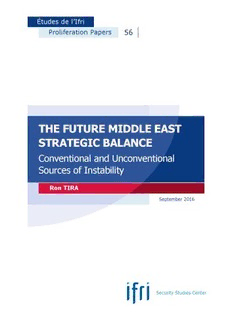Table Of ContentÉtudes de l’Ifri
Proliferation Papers 56
THE FUTURE MIDDLE EAST
STRATEGIC BALANCE
Conventional and Unconventional
Sources of Instability
Ron TIRA
September 2016
Security Studies Center
The Institut français des relations internationales (Ifri) is a research center
and a forum for debate on major international political and economic
issues. Headed by Thierry de Montbrial since its founding in 1979, Ifri is a
non-governmental, non-profit organization.
As an independent think tank, Ifri sets its own research agenda, publishing
its findings regularly for a global audience. Taking an interdisciplinary
approach, Ifri brings together political and economic decision-makers,
researchers and internationally renowned experts to animate its debate
and research activities.
With offices in Paris and Brussels, Ifri stands out as one of the rare French
think tanks to have positioned itself at the very heart of European and
broader international debate.
The opinions expressed in this text are the responsibility of the author alone.
ISBN: 978-2-36567-605-2
© All rights reserved, Ifri, 2016
How to quote this document:
Ron Tira, “The Future Middle East Strategic Balance.
Conventional and Unconventional Sources of Instability”, Proliferation Papers,
No. 56, September 2016.
Ifri
27 rue de la Procession 75740 Paris Cedex 15 – FRANCE
Tel.: +33 (0)1 40 61 60 00 – Fax : +33 (0)1 40 61 60 60
Email: [email protected]
Ifri-Bruxelles
Rue Marie-Thérèse, 21 1000 – Brussels – BELGIUM
Tel.: +32 (0)2 238 51 10 – Fax : +32 (0)2 238 51 15
Email: [email protected]
Website: Ifri.org
Proliferation Papers
Proliferation Papers is the publication of the Deterrence and
Proliferation Program established within the French Institute of
International Relations (Ifri)'s Security Studies Center. This collection of
monographs reflects the program's ambition to stimulate public debate and
to further our understanding of the complexity of the nuclear issue in its
strategic, technical, regional, diplomatic, legal, and budgetary dimensions.
About the author
LTC Ron Tira (Res.) is the author of The Nature of War: Conflicting
Paradigms and Israeli Military Effectiveness as well as other books and
publications on policy, strategy, warfare and the Middle East. Currently a
businessman and a reservist at the Israel Air Force's Campaign Planning
Department, Tira is a former fighter pilot with over 30 years of experience
in intelligence, special operations and campaign planning. He regularly
contributes publications to the Tel Aviv-based Institute for National
Security Studies and he is a contributor to most major Israeli newspapers.
Tira contributed a publication to Policy Review, a journal of the Hoover
Institution, Stanford University. Tira further serves on the Editorial
Advisory Panel of Infinity Journal, a peer-reviewed publication concerned
with strategy as a consequence of linking policy ends, strategic ways, and
military means.
Editorial board
Editor: Corentin Brustlein
Layout assistant: Louise Mingasson
Abstract
This paper seeks to analyze the future Middle Eastern military balance of
power, in a time horizon of five to ten years. It attempts to map future key
players, and to identify future fault lines and subjects of regional
competition. It then analyzes what drives military effectiveness, and
examines the military paradigms of the key players, highlighting the
growing gap between these paradigms and the regional context in which
they would have to be applied, resulting in the inability of key regional
players to overthrow their peers using hard power and the challenges they
face to shape most of the conflicts conducted on distant, third-party soil.
Finally, in terms on non-conventional capabilities, the Iranian nuclear
endeavor is likely to drive Sunni powers to the nuclear threshold either
after or even before the nuclear agreement’s 10 to 15-year horizon, while
rudimentary chemical, biological and radiological weapons might become
the non-states’ weapon of choice for mass impact.
Résumé
Cet article évalue ce que pourraient être les équilibres militaires et
stratégiques au Moyen-Orient à un horizon de cinq à dix ans. Il en identifie
les principaux acteurs et les sources de rivalités régionales susceptibles de
les opposer. Du fait des limites de leurs capacités militaires, les principaux
acteurs régionaux ne seront pas en mesure de renverser leurs adversaires
par la force armée, et seront ainsi contraints de recourir à des guerres par
procuration à l’efficacité pour le moins incertaine. Dans le domaine non-
conventionnel, la région pourrait voir à la fois la multiplication des États
sunnites « du seuil » se prémunissant face aux ambitions iraniennes, et une
banalisation relative de l’emploi d’armes chimiques, biologiques ou
radiologiques rudimentaires par les acteurs non-étatiques de la région.
Table of contents
INTRODUCTION .................................................................................................. 9
THE FUTURE MIDDLE EAST: ACTORS AND FAULT LINES ..............................13
Actors ...................................................................................................................... 13
Fault Lines .............................................................................................................. 15
Military Effectiveness and the Primacy of Context ............................................ 19
FUTURE MILITARY BALANCE OF POWER – THE CONVENTIONAL SPHERE ..33
Regional Powers .................................................................................................... 33
Array of Paradigms ................................................................................................ 35
Military Paradigm Tested in Context ................................................................... 38
Contextual Military Effectiveness ........................................................................ 43
Conventional Force: Non-State Actors ................................................................ 45
FUTURE MILITARY BALANCE OF POWER – THE UNCONVENTIONAL SPHERE ... 49
JCPOA: A milestone Toward Nuclearization? ..................................................... 49
No MAD in the Middle East ................................................................................... 51
Iran: The Implausible Partnership ...................................................................... 54
Chemical Weapons and Non-State Actors .......................................................... 55
CONCLUSIONS ..................................................................................................57

